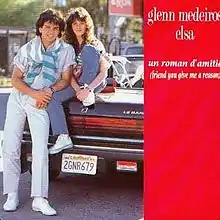Un roman d'amitié (Friend You Give Me a Reason)
"Un Roman d'amitié (Friend You Give Me a Reason)" is a 1988 song recorded by the French artist Elsa Lunghini and the American artist Glenn Medeiros. The song was released as a single in the summer of 1988 and features on the self-titled LP Elsa.
| "Un Roman d'amitié (Friend You Give Me a Reason)" | ||||
|---|---|---|---|---|
 | ||||
| Single by Elsa Lunghini and Glenn Medeiros | ||||
| from the album Elsa | ||||
| B-side | "Instrumental" | |||
| Released | 1988 | |||
| Genre | Pop | |||
| Length | 4:20 | |||
| Label | Mercury | |||
| Songwriter(s) | Robbie Buchanan, Diane Warren, Didier Barbelivien | |||
| Producer(s) | Robbie Buchanan | |||
| Elsa Lunghini singles chronology | ||||
| ||||
| Glenn Medeiros singles chronology | ||||
| ||||
Background
In 1988, Elsa was invited to a French TV programme to perform her second single, "Quelque chose dans mon cœur". Jean-Pierre Foucault, the host of the show, made her the surprise to invite Glenn Medeiros of whom Elsa was a fan. The two singers got on and finally decided to record two songs together: "Love Always Finds a Reason", written by Diane Warren, which was recorded in full in English-language and added on Glenn Medeiros' album, and "Un Roman d'amitié", whose complete title is actually "Un Roman d'amitié (Friend You Give Me a Reason)", as it appears on the single's cover.[1]
This is a bilingual song that mixes English and French lyrics. The text and the music were composed by Robbie Buchanan, Diane Warren and Didier Barbelivien.
The music video was entirely shot in Los Angeles by Maxime Ruiz. It starts with a view at night on the town, then we see the singers strolling the streets of the city on foot or by bike cross.
Both singers promoted the song in the world, even in the Netherlands. Glenn Medeiros re-recorded the song in a full English version with Ria Brieffies who performed the song with him in the United States. While the Franco-English version is about friendship, the full English version speaks of love.
Elsa sang live at her concert at the Olympia in 1990 and during the next tour, but Glenn Medeiros was replaced by Roger Secco.
Chart performances
The single achieved a huge success in France. It debuted at number eight on French Singles Chart on 23 July 1988 and reached number two, two weeks later. There it stayed for six weeks, behind the summer hit "Nuit de folie" by Début de Soirée, but managed then to top the chart for six consecutive weeks. Certified Gold disc by the SNEP for a minimum of 500,000 copies sold,[2] the single remained on the chart (Top 50) for 25 weeks.[3]
The song is the 167th best-selling single of all time in France.[4]
Track listings
- 7" single
- "Un Roman d'amitié (Friend You Give Me a Reason)" — 4:20
- "You're My Woman, You're My Lady" (instrumental) — 3:39
- CD single
- "Un Roman d'amitié (Friend You Give Me a Reason)" — 5:25
- "Un Roman d'amitié (Friend You Give Me a Reason)" (instrumental) — 4:20
- "You're My Woman, You're My Lady" (instrumental) — 3:39
- "Pieces of My Dreams" - by Glenn Meideiros
- 7" single - English version
- "Love Always Finds a Reason" — 4:20
- "Pieces of My Dreams" (by Glenn Medeiros) — 4:01
Charts and sales
Peak positions
|
Year-end charts
Certifications and sales
|
References
- Habib, Elia (2002). Muz hit.tubes (in French). Alinéa Bis. p. 141. ISBN 2-9518832-0-X.
- "Toutes les certifications depuis 1973" (in French). Infodisc. Retrieved 15 August 2008.
- ""Un Roman d'amitié (Friend You Give Me a Reason)", French Singles Chart" (in French). Lescharts. Retrieved 25 December 2008.
- "Best-selling singles of all time in France" (in French). Infodisc. Retrieved 25 December 2008.
- ""Un roman d'amitié", Belgian (Flanders) Singles Chart" (in Dutch). ultratop.be. Retrieved 7 March 2014.
- ""Love Always Finds a Reason", Dutch Top 40" (in Dutch). Dutchcharts. Retrieved 23 October 2010.
- "1988 Belgian Flanders Singles Chart" (in Dutch). ultratop.be. Retrieved 7 March 2014.
- "1988 Year End Eurocharts" (PDF). Music & Media. January 1, 1988. p. 30. Retrieved January 14, 2020.